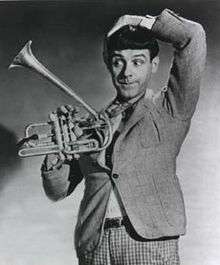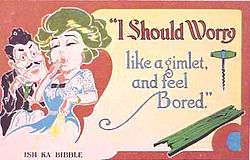Ish Kabibble
Ish Kabibble (January 19, 1908 – June 5, 1994) was an American comedian and cornet player. Born Merwyn Bogue in North East, Pennsylvania, he moved to Erie, Pennsylvania, with his family a few months after his birth.
Ish Kabibble | |
|---|---|
 | |
| Born | Merwyn Bogue January 19, 1908 North East, Pennsylvania, U.S. |
| Died | June 5, 1994 (aged 86) Palm Springs, California, U.S. |
| Occupation | Comedian, cornet player |
| Years active | 1931-1959 |
| Spouse(s) | Janet (Meade) Bogue (1932-1994) (his death) (3 children)[1] |
| Children | Merwyn (b. 1937) Pamela (b. 1940) Janet (b. 1941)[2] |
| Relatives |
|
Career
Bogue studied law at West Virginia University, but his comedy antics soon found an audience. He performed with Kay Kyser on the radio and television quiz show Kay Kyser's Kollege of Musical Knowledge in 1949 and 1950. Bogue also appeared in ten movies between 1939 and 1950. In Thousands Cheer (1943), he appeared with Kyser and sang "I Dug a Ditch", and he also appeared as a vocalist in That's Right—You're Wrong (1939), You'll Find Out (1940), and Playmates (1941).

In his 1989 autobiography, Bogue explained his stage name, which he took from the lyrics of one of his comedic songs, "Isch ga-bibble."[3]
The song derived from a mock-Yiddish expression, "Ische ga bibble?", which was purported to mean "I should worry?", prompting a curious (and perhaps not coincidental) association with the "What, me worry?" motto of Mad Magazine's mascot, Alfred E. Neuman. While this derivation has been widely quoted on the Internet and elsewhere, the expression "ische ga bibble" is not Yiddish and in fact contains no Yiddish words at all.[4] However, there is a Yiddish expression, "nisht gefidlt," meaning "it doesn't matter to me," from which the term "ish kabibble" may derive.
Although Bogue's stage persona was that of a dumb person, he was a notable cornet player and was also business manager for the Kay Kyser Orchestra from 1931 to 1951. With the decline of the big bands, Bogue found a new career in real estate. By 1973, he was living in Hawaii, causing double-takes from prospective clients who saw his trademark haircut and read his business card: "Ish Kabibble, Sales Manager".
Personal life
Bogue married Janet Meade in 1932, and the couple had three children: Merwyn (known as Peter), born 1937; Pamela, 1940; and Janet, 1941, according to the book Ish Kabibble: The Autobiography of Merwyn Bogue (1989), co-written by Bogue and his sister, Gladys Bogue Reilly.
Bogue died in 1994 in Joshua Tree, California, of respiratory failure brought on by pulmonary disease and emphysema.
Cultural legacy
Kabibble's distinctive black hair in a bowl cut, similar to that used by Three Stooges member Moe Howard, is said to have been an inspiration for the hairstyle worn by Jim Carrey's character in Dumb and Dumber.
The name "Ish Kabbible" was used for a hoax student supposedly enrolled at Princeton University in the 1950s.
Around 1983, Ish Kabibble was the voice recording for the animated series Challenge of the GoBots. This predecessor to the more popular Transformers series also had humans allied with both sides of feuding mechanical extraterrestrials. One example was Soviet Russian scientist Dr. Anya Turgenova. Towards the end of the pilot episode, she muttered, "Ishkabibble!" in boredom after hearing her friends' summoned to a U.S. federal government inquiry.
In 1985, the character's name was used as a plot device on the animated series The Thirteen Ghosts of Scooby-Doo when Scooby and the gang, along with an animated spoof of Vincent Price, go in search of the Amulet of Ish Kabibble.
In the TV show M*A*S*H, Alan Alda's character Hawkeye Pierce several times refers to Ish Kabibble. Once Pierce asks whom he and Trapper John should drink to—"MacArthur or Ish Kabibble?" Another time he refers to Ish Kabibble and his All-Girl Orchestra and refers to him as part of a dream. In the TV show Green Acres, Sam Drucker sells "Ish Kabibble" kazoos. In the "Cousin Maude's Visit" episode of All in the Family, Maude refers to how the name "Ish Kabibble" makes Archie Bunker laugh, in an automatic juvenile response.
In the animated sitcom Sit Down Shut Up, Ish Kabbible is referred to several times in one episode.
In the movie Photographing Fairies, Ish Kabbible is used a few times as a toast.
A children's book, "Ishkabibble!" by Dorothy Crayder, with art by Susan Vaeth was published in 1975. The word in the book is a nonsense motivational term, and is revealed to translate as "who cares?" as in the alleged etymology from above.
The academic society known as The International Society for History, Philosophy, and Social Studies of Biology goes by the acronym ISHPSSB, but the abbreviation is commonly pronounced ″ishkabibble″ at the suggestion of David Hull, as an homage to Bogue.[5]
Kay Kyser and Ish Kabibble are caricatured as Kaynine Kyser and Ish Kyoodle in the Warner Bros. Merrie Melodies cartoon "Hollywood Canine Canteen." Ish Kabibble recited a poem ("Roses are red / Violets are blue / If skunks had a college / They'd call it P.U.").
References
- "Ish Kabibble, Comic And Cornetist, 86". The New York Times. Associated Press. June 8, 1994.
- Oliver, Myrna (June 7, 1994). "Ish Kabibble; Comic Trumpet Player for Kay Kyser Band". Los Angeles Times. Retrieved 2020-02-10.
- "Ishkabibble (I should worry)", Music by George W. Meyer, Words by Sam M. Lewis, Geo. W. Meyer Music Co., 1913.
- "Ishkabibble". World Wide Words. 2005-08-27. Retrieved 2015-12-03.
- "Origins of "Ishkabibble"". International Society of the History, Philosophy and Social Studies of Biology. Archived from the original on 2013-06-26. Retrieved 2020-02-10.